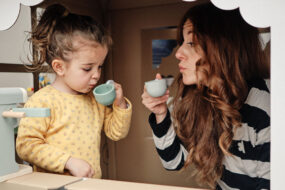The household items your furry friends need to avoid
Chocolate isn’t the only human treat off-limits for our fur-pals. Many common household items can be just as worrying if your pet gets their paws on them.
While we love having our four-legged mates share in every element of our lives, to keep them happy and healthy, here are some common household items you need to make sure they steer clear of.
- Winter wellness: 7 ways to keep your furry friend healthy
Houseplants
Those who are passionate about greenery may know which of their houseplants are toxic for pets however, this list can be extensive.
Common toxic houseplants include daffodil, elderberry, lily of the valley and rhododendrons.
Any plant brought into the home should be identified before coming into contact with pets, as some can be deadly.
Veterinarian Dr Bruce Mackay says the one of the most common signs of toxin ingestion is vomiting.
“Veterinary attention should be sought immediately if there is a suspicion that your pet has ingested a toxin,” Dr Mackay says.
- Festive fizzle: Common Christmas foods that are toxic for pets
Jerky products
Jerky products are mostly dried meat, so it should be safe to give pets, right?
Dr Mackay says over the last decade, Australian and overseas veterinarians have recognised acute kidney disease associated with the ingestion of several jerky products.
“This has mainly been seen in small dogs and can be life threatening depending on severity, and how soon the patient receives treatment,” he says.
Bread dough and playdough
Raw bread dough and even playdough can be extremely toxic for pets in different ways, due to their ingredients.
Raw bread dough contains yeast, which is toxic for both dogs and cats as it can lead to alcohol poisoning.
When yeast and sugar from dough ferments in the stomach, it can result in symptoms such as vomiting, swollen stomach and even collapse.
Playdough is toxic for pets due to its high salt content.
Pets with pre-existing heart conditions are most at risk of poisoning if they ingest it, says VetChat founder Dr Claire Jenkins.
“It’s really important that pets with heart disease are fed the right level of salt for their (very) individual circumstances, and certainly avoiding high salt snacks,” Dr Jenkins says.
Signs your pet may have eaten playdough include seizures, lack of coordination and coughing.
- Paw-fect pals: How pets boost health and happiness
Salt and salty snack foods
Playdough isn’t the only source of high-salt snacks your pet might indulge in – and they don’t need to ingest a lot for it to be a problem, according to Dr Jenkins.
“Even a mere teaspoon of salt eaten by a 10kg dog can cause salt toxicity in as little as 30-60 minutes time,” Dr Jenkins says.
“On VetChat, two of the top causes of suspected salt toxicity are from drinking the ocean water at the beach and eating homemade play dough.”
Xylitol is toxic for pets
Xylitol is a sugar alcohol found naturally in berries, oats, mushrooms and lettuce and is often used in chewing gum, chewable multi-vitamins, oral health products including toothpaste, and even some peanut butter.
Xylitol is highly toxic for dogs yet does not seem to produce the same toxic response in cats.
While peanut butter is a common treat among dog owners, Dr Mackay says owners should check the packaging as only some jars contain the toxin.
“Xylitol can cause an acute liver disease and also profoundly low blood sugar,” Dr Mackay says.
Dr Jenkins recommends always keeping a lookout for anything troublesome your pet might decide to snack on.
“For any unusual ingestion always contact your veterinarian to learn whether you need to take your pet in,” Dr Jenkins says.
Written by Chloe Henry.





